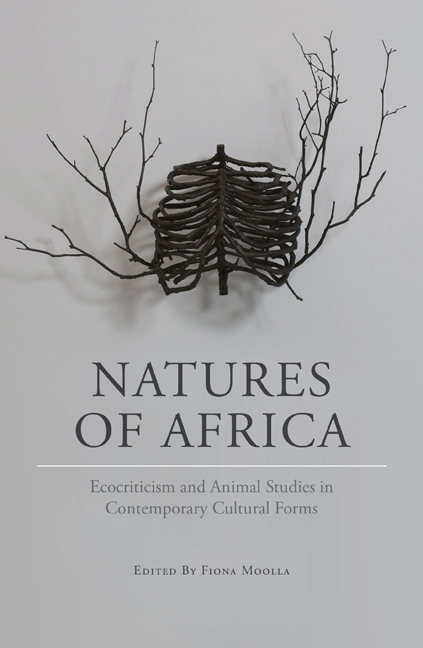Book contents
- Frontmatter
- Table of Contents
- Foreword
- Introduction
- 1 ‘Here is Some Baobab Leaf!’: Sunjata, Foodways and Biopiracy
- 2 Shona as a Land-Based Nature-Culture: A Study of the (Re)Construction of Shona Land Mythology in Popular Songs
- 3 The Environment as Significant Other: The Green Nature of Shona Indigenous Religion
- 4 Animal Oral Praise Poetry and the Samburu Desire to Survive
- 5 The Paradoxes of Voluntourism: Strategic Visual Tropes of the Natural on South African Voluntourism Websites
- 6 Towards an Ecocriticism in Africa: Literary Aesthetics in African Environmental Literature
- 7 Critical Intersections: Ecocriticism, Globalised Cities and African Narrative, with a Focus on K. Sello Duiker's Thirteen Cents
- 8 Navigating Gariep Country: Writing Nature-Culture in Borderline by William Dicey
- 9 Negotiating Identity in a Vanishing Geography: Home, Environment and Displacement in Helon Habila's Oil on Water
- 10 Human Masks? Animal Narrators in Patrice Nganang's Dog Days: An Animal Chronicle and Alain Mabanckou's Memoirs of a Porcupine
- 11 Nature, Animism and Humanity in Anglophone Nigerian Poetry
- 12 Animals, Nostalgia and Zimbabwe's Rural Landscape in the Poetry of Chenjerai Hove and Musaemura Zimunya
- About the authors
- Acknowledgements
- Notes
- Index
10 - Human Masks? Animal Narrators in Patrice Nganang's Dog Days: An Animal Chronicle and Alain Mabanckou's Memoirs of a Porcupine
Published online by Cambridge University Press: 10 May 2018
- Frontmatter
- Table of Contents
- Foreword
- Introduction
- 1 ‘Here is Some Baobab Leaf!’: Sunjata, Foodways and Biopiracy
- 2 Shona as a Land-Based Nature-Culture: A Study of the (Re)Construction of Shona Land Mythology in Popular Songs
- 3 The Environment as Significant Other: The Green Nature of Shona Indigenous Religion
- 4 Animal Oral Praise Poetry and the Samburu Desire to Survive
- 5 The Paradoxes of Voluntourism: Strategic Visual Tropes of the Natural on South African Voluntourism Websites
- 6 Towards an Ecocriticism in Africa: Literary Aesthetics in African Environmental Literature
- 7 Critical Intersections: Ecocriticism, Globalised Cities and African Narrative, with a Focus on K. Sello Duiker's Thirteen Cents
- 8 Navigating Gariep Country: Writing Nature-Culture in Borderline by William Dicey
- 9 Negotiating Identity in a Vanishing Geography: Home, Environment and Displacement in Helon Habila's Oil on Water
- 10 Human Masks? Animal Narrators in Patrice Nganang's Dog Days: An Animal Chronicle and Alain Mabanckou's Memoirs of a Porcupine
- 11 Nature, Animism and Humanity in Anglophone Nigerian Poetry
- 12 Animals, Nostalgia and Zimbabwe's Rural Landscape in the Poetry of Chenjerai Hove and Musaemura Zimunya
- About the authors
- Acknowledgements
- Notes
- Index
Summary
Non-human animal narrators may seem more consistent with folk tales or narratives written for children, but a number of recent novels for adults have animals as the central narrators or focalisers, including Paul Auster's Timbuktu (1999), Kerstin Ekman's The Dog (2009) and Joseph Smith's The Wolf (2008). Other novels have dogs as partial focalisers or points of view: Orhan Pamuk's My Name is Red (1998), David Wroblewski's The Story of Edgar Sawtelle (2008) and John Banville's The Infinities (2009). Cameroonian Patrice Nganang, in Dog Days: An Animal Chronicle (2006) (henceforth referred to as Dog Days), and Congolese Alain Mabanckou, in Memoirs of a Porcupine (2011) (henceforth Memoirs), may seem to be conforming to an international trend with their animal narrators, but Nganang's dog and Mabanckou's porcupine are specifically African beings. Anthony Vital asks in Chapter 7 of this volume, ‘What would need to enter [globally situated ecocriticism] to account for what makes African worlds distinct?’. This chapter asks a similar question in relation to literary human–animal studies, as it offers a reading that engages with the African particularities of these two novels. In doing so, it challenges conventional literary criticism, which favours, anthropocentrically, culture over nature, the human over the non-human.
Both novels are francophone translations into English, but the significance of their French provenance is difficult to determine. Animal figures do perhaps occur in French fairy tales more than in English ones, for example, but animal agents and/or tricksters also appear in traditional myths throughout Africa. Nganang's translator, Amy Baram Reid, insists that the novel derives from ‘myriad connections to literature from around the world’ (Reid 2006: 212), as well as from cartoons by Popoli, which had dogs and cats as political commentators (Reid 2006: 229). Mabanckou's story was inspired by his mother's traditional tales, and he refers specifically to her belief in harmful animal doubles, creatures whom he found especially frightening (Sullivan 2012). In Kofi Opoku's ‘Animals in African mythology’, he notes the significance of animals in the ‘sacred wisdom’ of Africa, which he ascribes to their sharing the world with humans, as well as their experiencing ‘the same faculties, and the same experience of life and death’ (Opuku 2006: 351). Through their narratives, Mabanckou and Nganang modernise and subvert such high seriousness in African mythology.
- Type
- Chapter
- Information
- Natures of AfricaEcocriticism and Animal Studies in Contemporary Cultural Forms, pp. 235 - 256Publisher: Wits University PressPrint publication year: 2016



